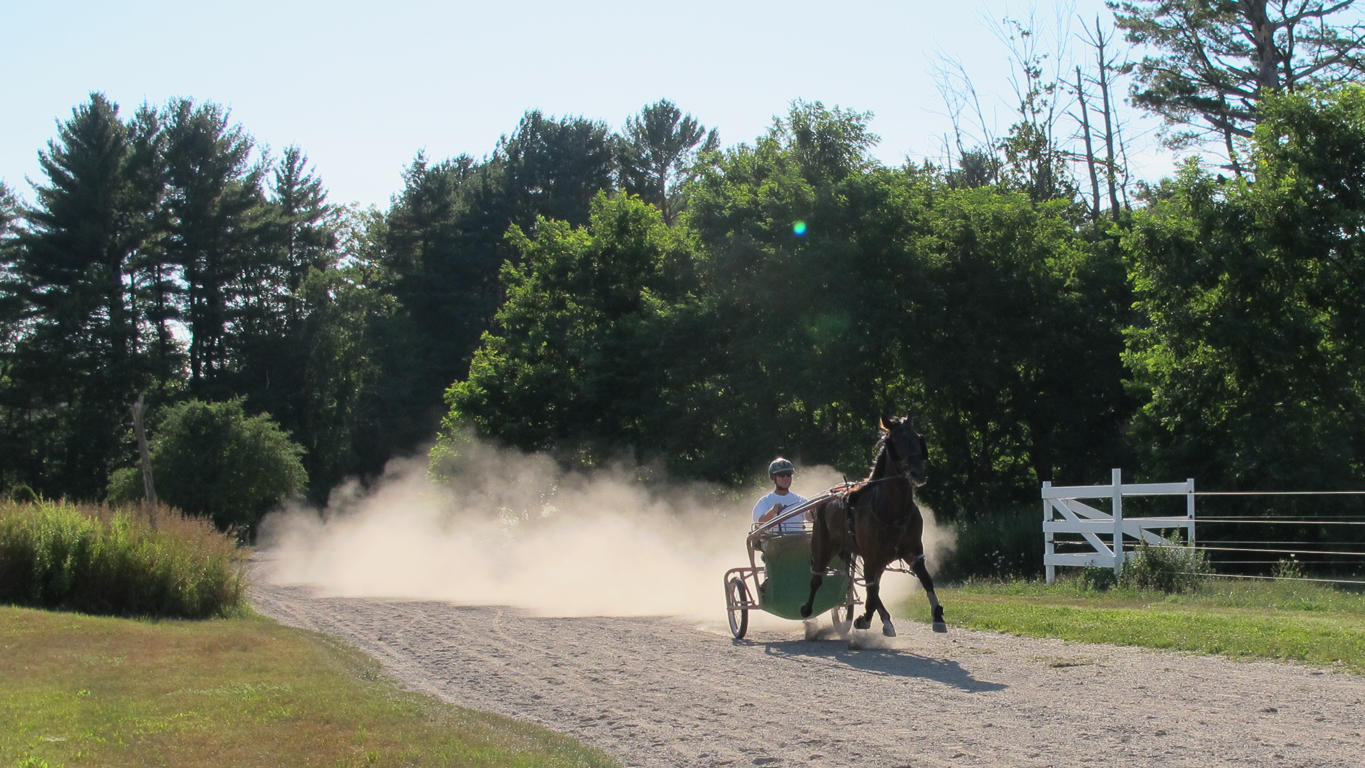More than a decade ago, Maine voters gave the green light to slot machine gambling in the state. In making their case to voters, supporters vowed that some of the revenues would prop up the state’s ailing harness racing industry. But recent data show that since then, more than $100 million dollars in slot machine proceeds have gone to the industry in Maine — and it’s still struggling.
Back in 2003, lawyer, horse farmer and sometime racehorse driver William Childs spent a lot of time in Augusta, trying to convince the Legislature to approve slot machines in Maine.
“It would revitalize harness racing,” he said at the time. “We pretty much race for the same purses now that my grandfather raced for in 1970, and of course the costs haven’t remained the same.”
Childs and others viewed slots as a way to revive the beleaguered harness racing industry, keep pastures from getting paved over with parking lots, blacksmiths busy shoeing horses, breeders buying feed and trucks.
Slot revenues have boosted purses, helped the state’s 26 agricultural fairs and made direct payments to Bangor Raceway and Scarborough Downs — no strings attached.
The horses are still trotting at Bangor Raceway, a few hundred yards from Hollywood Casino, which became the state’s first legal gambling venue in 2006. But Scarborough voters refused to authorize slots at their track, and horsemen say that was a big setback.
Still, state records show that more than $100 million has been sluiced from gamblers’ pockets to Maine’s harness racing industry and agricultural fairs. But has it done the trick?
To try to find out, I recently visited Childs’ horse farm, a 30-acre bit of rural bliss in Westbrook. Race Me Stables is an active place where horses are trained and boarded, lessons are given, and equestriennes can practice their paces. Childs prepared one of his racing pacers, RaceMeAndroid, for a run around a half-mile training track.
More than a decade ago, Maine voters gave the green light to slot machine gambling in the state. In making their case to voters, supporters vowed that some of the revenues would prop up the state’s ailing harness racing industry. But recent data show that since then, more than $100 million dollars in slot machine proceeds have gone to the industry in Maine — and it’s still struggling.
Back in 2003, lawyer, horse farmer and sometime racehorse driver William Childs spent a lot of time in Augusta, trying to convince the Legislature to approve slot machines in Maine.
“It would revitalize harness racing,” he said at the time. “We pretty much race for the same purses now that my grandfather raced for in 1970, and of course the costs haven’t remained the same.”
Childs and others viewed slots as a way to revive the beleaguered harness racing industry, keep pastures from getting paved over with parking lots, blacksmiths busy shoeing horses, breeders buying feed and trucks.
Slot revenues have boosted purses, helped the state’s 26 agricultural fairs and made direct payments to Bangor Raceway and Scarborough Downs — no strings attached.
The horses are still trotting at Bangor Raceway, a few hundred yards from Hollywood Casino, which became the state’s first legal gambling venue in 2006. But Scarborough voters refused to authorize slots at their track, and horsemen say that was a big setback.
Still, state records show that more than $100 million has been sluiced from gamblers’ pockets to Maine’s harness racing industry and agricultural fairs. But has it done the trick?
To try to find out, I recently visited Childs’ horse farm, a 30-acre bit of rural bliss in Westbrook. Race Me Stables is an active place where horses are trained and boarded, lessons are given, and equestriennes can practice their paces. Childs prepared one of his racing pacers, RaceMeAndroid, for a run around a half-mile training track.
“We’re still here,” he said, soon after a blacksmith finished re-shoeing the horse. “Without the referendum, without the racino in Bangor, Bangor would not have survived, Scarborough Downs I don’t think would have survived. The fairs would have been severely impacted — The industry would have folded up.”
Childs said the purse supplements have boosted his winnings enough to help him keep the stable’s doors open, at a time when prices - for hay and grain, for veterinarians and taxes - all keep going up.
“Without it this would be house lots,” Childs said. “It still may be house lots.”
The industry did see a bump after the 2003 referendum, with more owners, racehorses and breeding horses coming on the scene. But the longer-term trend is in the other direction. Between 2007 and 2015 the number of Maine-registered harness racing stallions, for instance, that were available for breeding declined by more than half, from 73 down to 30. The number of foals has declined to just 83 last year.
“We still have people that want to buy horses,” said Dianne Perkins, president of the Maine Standardbred Breeders and Owners Association. “Our goal right now is to find mares, get people to breed mares. We need horses.”
Perkins said its important to understand that the numbers were affected by the closure, for the owners’ personal reasons, of two of the largest breeding outfits. There’s also the black eyes the industry gets when horse doping cases come to light, a bad trend she says has been rising.
And then, she says, there’s something else.
“OK I am going to say right now,” she said, “there’s a little bit of lack of interest, OK?”
Some owners, she says, are having a tough time finding appropriate races to enter in Maine, and they are shipping their stock out of state, often to Amish buyers.
And at Scarborough Downs, the center of the state’s harness industry, times are a little tough.
“There is an issue with horse supply right now,” says Mike Sweeney, spokesman and track oddsmaker at Scarborough Downs, which has canceled six race days this summer after failing to secure commitments for some 400 horse entries needed to fill out the race cards.
Like many in the industry, he says the rejection of a slots facility at Scarborough really hobbled the industry’s revival efforts. And even at Bangor, he said, the decision to locate the new gambling hall several hundred yards away from the track bypassed an opportunity to raise interest in racing among a new generation of gamblers — who have so many gaming opportunities not just at proliferating casinos, but online too.
In some other states, Sweeney says, some tracks have flourished when located right next to slots parlors.
“That’s never happened here in the state of Maine, and I think that’s one of the reasons the industry really is in a state of decline right now,” said Sweeney, president of the Maine Standardbred Breeders and Owners Association.
Scarborough and Bangor don’t publish attendance records, but here’s another indicator of where things are headed: Since 2006, the amount of money bet each year on races in Maine has fallen by more than half, from $68 million to $33 million last year.
State Rep. Louis Luchini, an Ellsworth Democrat who co-chairs the Joint Committee on Legal and Veterans Affairs, which has oversight of Maine’s gambling sector, sees the industry’s benefits to the state, but he points out that there are more pleasure horse owners than racehorse owners in Maine, and that they also benefit the economy.
“And we don’t give them any money from the casino,” he said. “[The horsemen’s] argument makes sense. They do have a big impact with agriculture, with the veterinarians, farming. But if you’re giving $100 million to something, you really have to make sure that it works.”
If Luchini is re-elected, you can bet he’ll be taking a close look at slot machine funds in the next legislative session.
Scarborough, meanwhile, will be asking for permission to reduce the number of race days it holds, while holding on to the $1 million-plus annual stipend it gets from the slots.
And members of the harness racing industry? Look for them to find ways to try to breathe new life into a pastime they hope still has a future in Maine.








